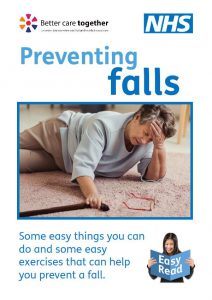Falls prevention
In Leicestershire thousands of people are injured each year in falls. Apart from the pain, discomfort and inconvenience, the after effects of a fall can be life changing.
Experiencing a fall is one of the major reasons for concern expressed by adults over the age of 65. Falls can have a significant impact on the quality of life for patients and 35% of over 65’s will experience at least one fall in a year. This figure rises to over 50% for the over 80 age group.
Since its inception in September 2017, the falls programme has changed the treatment pathway for older people to enable swifter access to therapy after a fall, to ensure those needing secondary care input do not need to wait so long, and provide services for older people to restore their strength and balance.
Our aim is to offer both professionals and patients the tools they need to ensure that the most appropriate course of action is taken to help each individual maintain their independence and remain in the community. These include:
- The Falls Triage and Assessment process across the county that continues to improve access to therapy for patients and patient outcomes. Since it launched and prior to the coronavirus pandemic and subsequent lockdowns patient reported experiencing the following benefits:
- Waiting time to see a clinician and commence therapeutic interventions reduced
- Holistic Therapy review and interventions to strengthen self-help, including home assessment to identify hazards etc.
- Therapy intervention provided while waiting to be seen by the consultant falls clinic should the onward referral still be required
- LPT and county adult social care working together to develop seamless therapy and falls prevention training to care home staff. This has seen:
- A large number of care homes benefit from environmental assessments
- Advanced falls prevention training for the staff
- The development of the falls prevention pathway “strength and balance” exercise programme Steady Steps, which is provided within the community at a variety of venues across the county. Each programme runs for six months and consists of 26 x two-hour sessions. People completing the programme report:
- Increased confidence and willingness to go out again
- Better balance and the confidence to avoid falling
- Confidence in their own skills and knowledge to pick themselves up if they do fall.
- Making new friends and extended social interactions leading to a better sense of self-worth.
Partners have also produced a range of materials offering people advice on looking after their health and wellbeing to help them prevent or reduce their risk of a fall.
The Leicester, Leicestershire and Rutland (LLR) Falls Prevention Group has produced a short film demonstrating a series of simple exercises designed to help people improve their health and wellbeing and reduce their risk of falling. These exercises have been developed by the LPT Falls Prevention Service to be done at home.
Click on the image above to view the Preventing falls easy read leaflet (2019)
The programme will be further enhanced over the coming months by a pilot scheme being conducted to understand the benefits of providing a non-emergency Falls response team. The pilot will run until the end of May 2022 and from 15 January 2022 will be available seven days a week (8.00 am to 8.00 pm).
Usually people referred to the ambulance service following a fall, dependent upon the outcome of the clinical triage assessment carried out, can wait up to six hours before a paramedic response vehicle attends. This increases the person’s risk of suffering further harm.
The concept of the pilot is as follows:
- Calls into the ambulance service will be triaged to ascertain the urgency of clinical response required.
- If a non-medical response would be appropriate, a specially trained team of staff will attend within sixty minutes and conduct a further assessment on scene.
- If still appropriate, portable lifting equipment will be deployed to lift the person back onto a safe surface such as a bed or chair.
- Alternatively, if clinically indicated at this assessment, a rapid response paramedic crew can be requested to attend.
The pilot will be evaluated to understand both the qualitative benefits for patients and the system savings from the resulting reduction in:
- Ambulance conveyances
- Emergency Department attendances
- In-patient admissions
- Delayed Transfers of Care
- On-going care packages often escalated following an in –patient stay.
For more information on who can make referrals, the referral process and the referral and exclusion criteria please contact the CCG service lead alison.brooks17@nhs.net
Useful links
Royal Society for the Prevention of Accidents (RoSPA)
RoSPA’s new National Accident Prevention Strategy for England – ‘Safe and active at all ages: a national strategy to prevent serious accidental injuries in England’ is now available visit https://www.rospa.com/national-strategy/
As part of RoSPA’s partnership with the Royal College of Emergency Medicine a factsheet has been released to mark RCEM’s 50th Anniversary celebrations. The factsheet supports the National Falls Consensus Statement, setting out the scale of the problem and highlighting the key solutions identified in the consensus statement.
https://www.rospa.com/home-safety/resources/rcem-golden-jubilee-resources/
https://www.rospa.com/home-safety/stand-up-stay-up/
Steady Steps
For further information on Steady Steps, the free, 24-week postural stability exercise programme for people aged 65 and over who are at risk of falling or who have previously fallen visit Active Together – formerly Leicester-Shire & Rutland Sport (LRS).
Links to other useful information are available on the Falls Prevention campaign page





